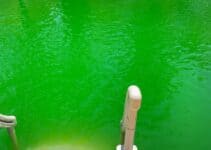About fifteen percent of all single-family homes in the United States have private or well water. And the percentage of homes with their own water source is much higher in areas away from the cites (the country).
As an above ground pool installer for more than three decades, I can tell you that most above grounds are built at houses out in the country. So, a lot of pools get filled with well water. When people can get me on the phone before they buy a pool or have it installed, they often ask about their well water.
11 COMMON QUESTIONS ABOUT FILLING AN ABOVE GROUND POOL WITH WELL WATER
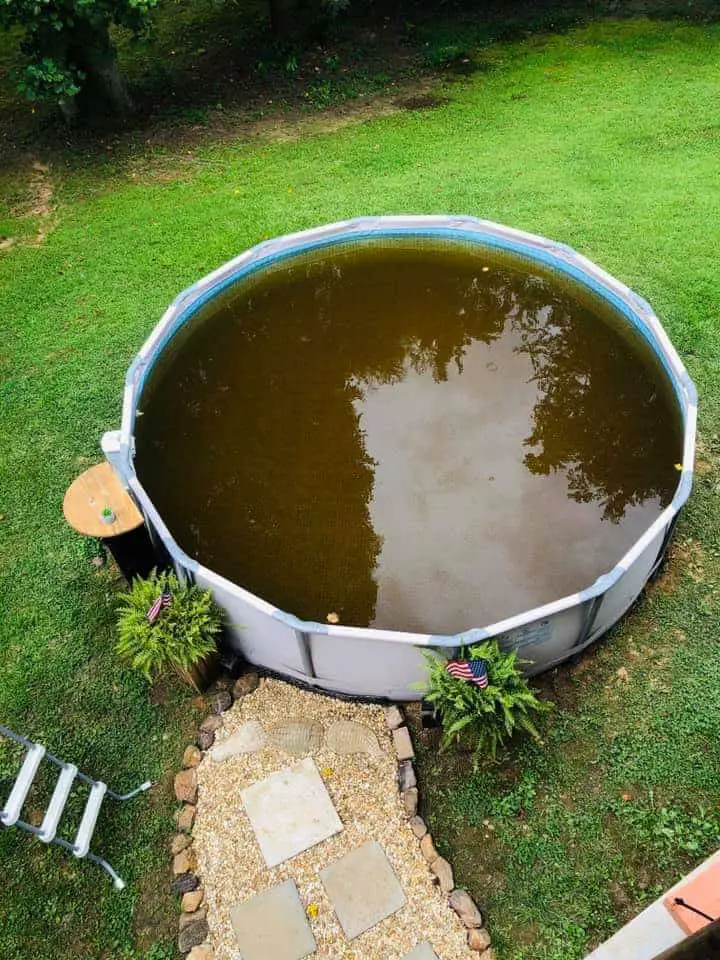
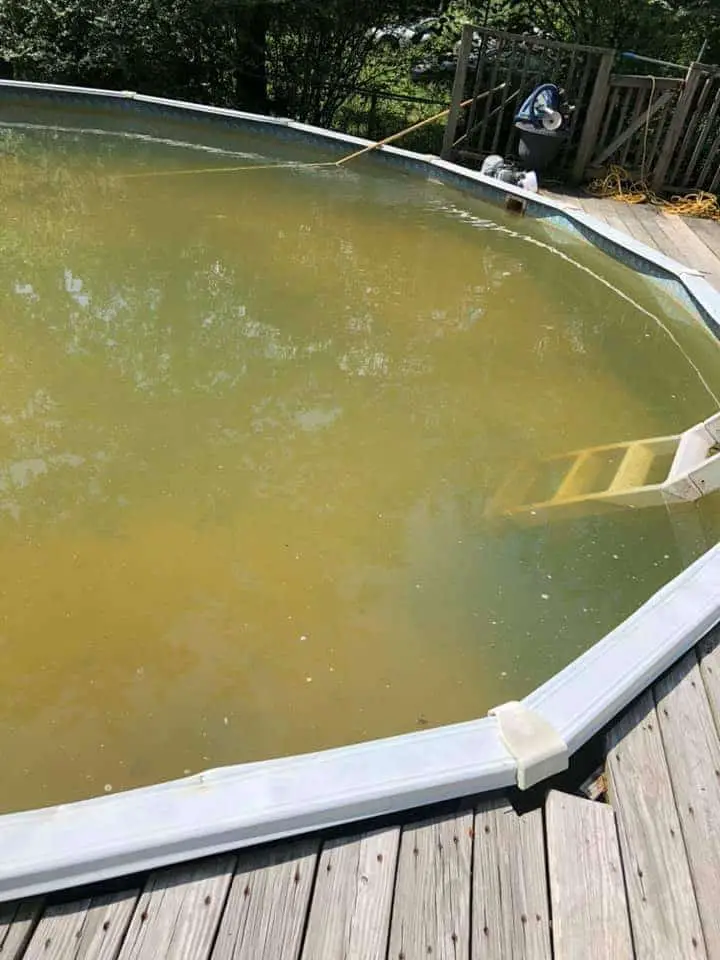
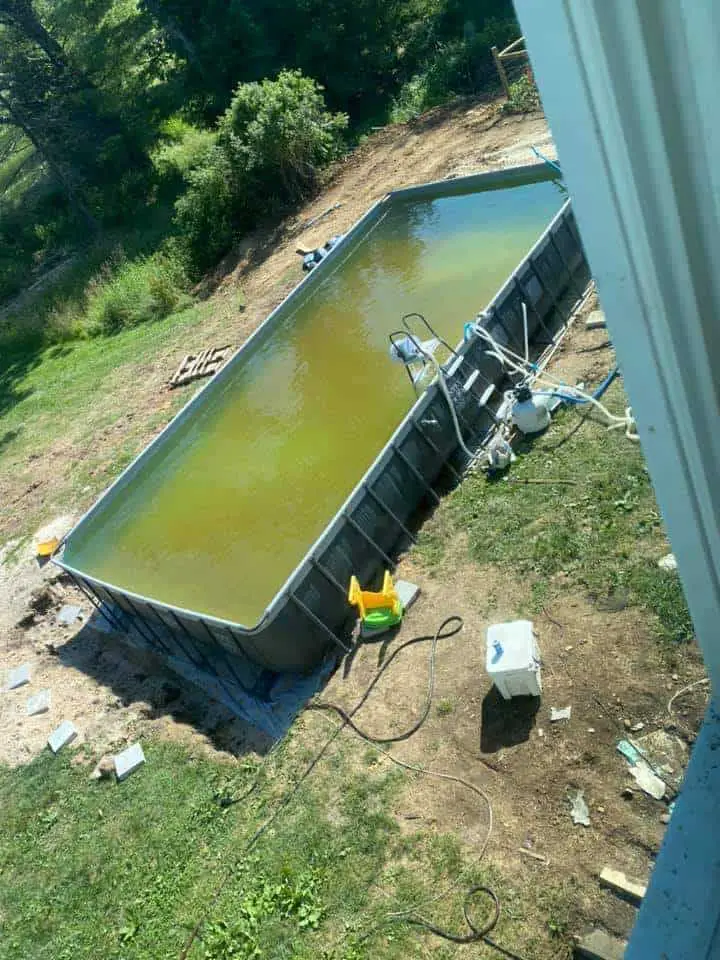
1 Can I fill my new pool with well water?
The short and long answer is “yes”. You may have to do some things later though depending on the quality of your well water. The quality of well water can range anywhere from perfectly clear, cold, and completely drinkable, all the way to warm, brown, sandy, ice tea looking, and very NON-drinkable.
Regardless of how bad your well water is, you can still fill the pool with it. You’ll just have to treat the pool later in order to take out or dissipate the things in the water that you don’t want.
2 I have both well water and municipal water. Which should I fill my pool with?
Some people are lucky enough to have both city water coming into their homes and have a well. Municipal or city water is by law treated and balanced to be safe for drinking. This means that it is pool water ready. It will come out of the hose clear and will most likely have at least a trace of chlorine (or some other sanitizer) in it making it safe for swimming. When the pool is full, you’ll still have to shock the water, but that should be about it for an above ground pool.
The drawback of filling the pool with your city water is that it costs money. And if you have city sewerage with it, then it can cost a lot to fill a pool with the thousands of gallons it needs.
Well water costs you nothing except the electricity the well pump uses, which isn’t much. There is a back end cost though to filling the pool with well water and how much depends on the quality of the water.
So, to answer this question, it depends on the quality of your well water. If your well water comes out clear and odorless, then most likely the well water is your best bet. That is as long as your well is in good shape and doesn’t run low or anything.
If your well water isn’t that good though, go with the city water. It may cost you upfront but the pool will be ready to swim in sooner and it will be easier.
3 Should I fill my pool with water directly from the well, or through the softener system that I have for the house?
This again depends on the quality of the water coming directly out of the well. A water softener usually takes salt or chlorine and will need to be regenerated. So since the system is designed to provide the water needed for a household, it will have to be serviced often while using it to fill a pool with thousands of gallons.
Because of this, it’s usually less expensive to just fill the pool directly from the well and treat the water in the pool when it is filled. Also, the GPM (gallons per minute) is usually greater from coming directly out of the well instead of going through the homes softener system. This is a consideration if you are wanting the pool to fill quickly.
4 Should I fill my pool with my well, or have a water truck come to fill it?
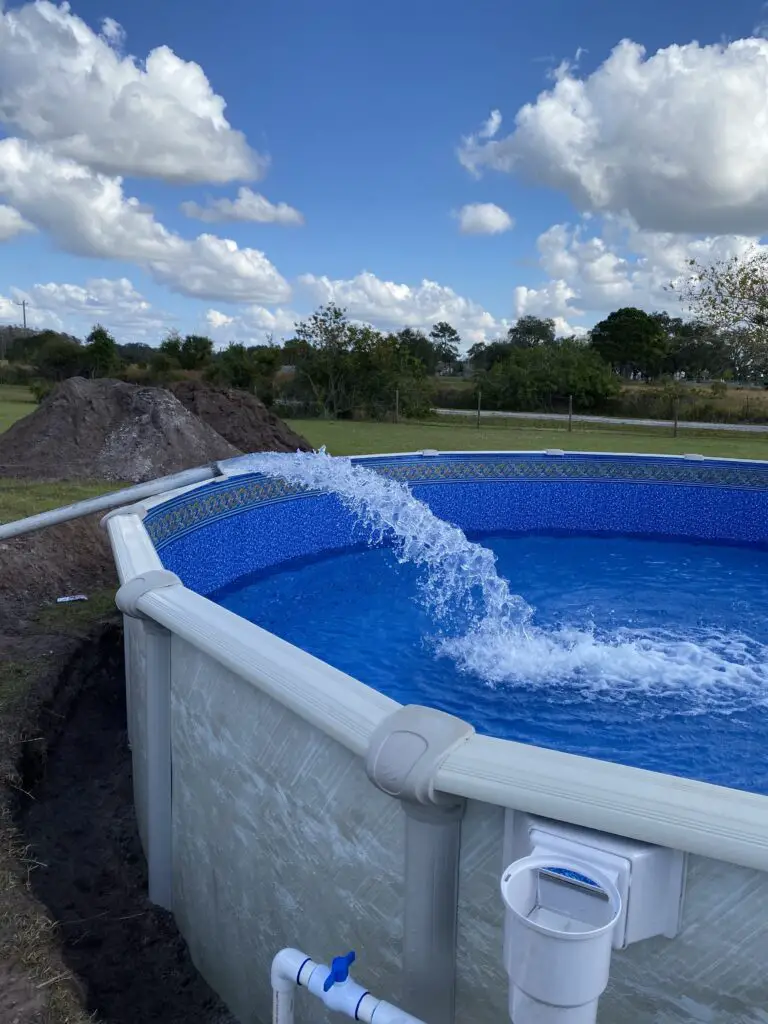
Paying to have a water truck come and fill your pool is quite expensive. Here in Central Florida, there are only a couple guys that deliver water and they ain’t cheap. One delivers six thousand gallons for $400, another guy has a 9k gallon truck and charges $675, and the last I heard of was this new guy who charges $475 for just 6k gallons.
Now, if you have a 24’ round pool, 52” deep, then that’s about fourteen thousand gallons of water. You can see then that having water delivered is pricey.
Because of the price, I usually advise to just fill your pool with your well. Even if the well water comes out like iced tea, it would still be much less expensive to just treat the water to clear.
If your well has some issues and you are just “limping” it along, then yes, maybe bite the bullet and fill with the water truck. Also, if your well water sucks and you have a pool party planned for the next weekend, then again yes, it may be worth it the pay for the truck.
5 Will the fire department come to fill my pool?
That is sooo 1980s. The answer is “no, not usually”. You probably won’t find any AquaNet hairspray for sale anywhere either. And no, Jean Claude Van Damme is not a real martial artist.
Seriously though, some small fire departments may still offer this somewhere in the United States, but it would be freakishly rare. And it’s not because Fire Departments aren’t nice anymore like they were back when there were phone booths. I have a friend who is a higher-up at the Orange County Fire department, and he explained to me that they now have to account for all of their water usage. So, they can’t just go around filling up swimming pools while using their fancy ladder to get your dumb indoor cat out of a tree.
6 How long can I run my well pump to fill the pool?
A well pump is pretty much the same thing as a pool pump. They consist of an impeller that moves the water (the pump) and an electric motor to turn the impeller. Those electric motors are designed to run continuously, so as far as the pump goes, it can run until it fills up your pool with no issues.
The real concern with continuously filling your pool with the well isn’t the pump then, it’s the well itself. If your well has a history of running dry or low on water, or if it draws up sand when you run it a lot, then give it a break when trying to fill your pool. It may need time to refill the well area with water so it can keep up with all the thousands of gallons of water you are pulling out of the earth.
All wells can be different. Don’t think because your well is super deep, it won’t run dry. And don’t think because your well is shallow, that it will run dry. Water stores in the earth at all different depths. I will say that most of the time if it has been raining a lot in your area, you have a better chance of not having any issues with your well filling a swimming pool.
7 My well water looks bad. What do I have to do once the pool is filled?
In this case (and most others too), it’s easiest and best to take a sample of your well water to your local pool store and have them test it. They may sell you some stuff you don’t really need, but they will get your water clear and healthy and ready for swimming.
In most cases, lots and lots of liquid chlorine will do the trick with most bad well water. This is the case because chlorine is an excellent oxidizer and will cause a lot of things in the water to dissipate and be gone forever. Some well water will have a lot of metals in it, so even though chlorine can oxidize it, it may be better to add a product to deal with the metals too. Your local pool store will be more than happy to help you.
8 My well water smells bad. Will I be able to get the smell to go away?
Yes, you will. Usually, chlorine will do the trick. Take a water sample to your pool store and let them sell you what you need. There may be some things in addition to chlorine and that’s OK.
9 How long will it take to get the well water in my pool to be clear and healthy?
This, of course, depends on the quality of your well water. If your well water comes out clear, then just the initial shocking of the pool and maybe a PH adjustment, and you are good to go in an hour.
If your well water has your pool looking like the biggest vat of iced tea the world has ever seen, then it’ll take some time. As mentioned earlier, chlorine is the big star here in getting the pool clear, so how much time it takes will depend on how much chlorine you are willing to put in the pool (or the amount the pool store tells you to put in).
A realistic timeframe for getting bad well water to turn clear and healthy in a swimming pool is two to five days. This is providing that you have a good pump and filter for the pool. The extremely cheaper Intex/Coleman type soft-sided pools come with terrible pump/filter systems. This may cause the pool to take extra time clearing up from poor well water.
10 Should I use one of those filters that attach to the water hose when filling my pool with well water?
Over the years, I’ve seen all kinds of products that attach to the garden hose that help filter out metals and other things from well water before it goes into the pool. These products range from $50 fancy filters that are only good for five thousand gallons each to people using socks wrapped over the end of the hose.
My opinion is that I usually don’t think it’s worth worrying about it. Personally, I wouldn’t go out of my way to buy a product that fits at the end of the water hose. I would just treat the water after it enters the pool. I say this because you will have to treat the water anyway. There is no product (or homemade sock remedy) that you can put on a hose that will prevent you from having to treat the well water after the pool is filled, so why bother with the expense.
In most cases, those gadgets will slow the filling time down as they can restrict the flow of water coming out of the hose, and I find that annoying. Especially when the thing isn’t doing much anyway AND people usually want to fill their pools ASAP.
11 My well water is pretty bad. Will it stain the liner in my pool?
My guess is that it is possible but not at all likely. As I write this article, I am in my thirty-fourth year installing pools. And I have never seen well water stain a pool liner. But, I have seen liners get stained by things entering the water, so I guess it’s possible.
The worst staining that I have ever seen in a vinyl above ground pool (other than severe neglect) was when someone poured diesel fuel into a pool. The diesel made a stain at the waterline that never fully came out.
With that said, if your well water is so nasty, that it has a lot of oil product in it, then maybe you should consider filling it with a water truck. If no water truck, then only fill the pool through your water softening system or whatever fancy thing you have to enable you to use the water in your home.

